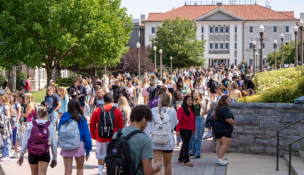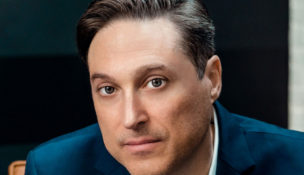George Mason President Gregory Washington deserves to stay
Three faculty members voice support for president

Gregory Washington took office as the eighth president of George Mason University on July 1, 2020. Photo by Lathan Goumas

Gregory Washington took office as the eighth president of George Mason University on July 1, 2020. Photo by Lathan Goumas
George Mason President Gregory Washington deserves to stay
Three faculty members voice support for president
SUMMARY:
- George Mason’s enrollment, rankings, and research profile have grown under Washington’s presidency
- Critics fear political pressure could lead to his removal amid federal probe
- Faculty warn that ousting Washington would threaten academic independence
When George Mason University began its search for a new president in fall 2019, Tom Davis was serving as rector of the board of visitors. Davis was a well-known former Republican congressman who chaired the influential House Government Reform Committee and led the National Republican Congressional Committee during the 2004 election cycle. No one ever questioned his conservative credentials. He kept politics out of board governance.
The presidential search committee was co-chaired by James W. “Jimmy” Hazel, the vice rector, and a seasoned GOP lobbyist and adviser. Like his late father, the developer and George Mason founding father John “Til” Hazel Jr., he has been a significant figure in the conservative business community.
It was under Davis and Hazel’s leadership that Gregory Washington was selected in 2020 as George Mason’s eighth president. “We were determined to find someone who was both a strategic thinker with the vision to see our future and a mobilizer with the ability to inspire our community,” Davis said at the time. “Dr. Gregory Washington stood out in a highly competitive search. He showed tremendous vision for the future of our region and how [George Mason] fit in and demonstrated the ability to motivate and inspire our community.” Hazel echoed similar praise for Washington.
By most university metrics, Washington has been a highly successful leader. Mason’s enrollment has grown, even as many other universities face declines. Its undergraduates are the most academically qualified in the university’s history, with 25% of new first-year students earning a GPA of 4.0 or higher. Mason’s rankings among public universities have risen considerably. Mason is one of the few R1 research universities to be designated as a Carnegie Opportunity College and University. Fans of Mason athletics are no doubt thrilled that this past year, Mason won five Atlantic 10 championships, including titles in women’s and men’s basketball.
But, like so many university leaders nationwide, Washington has faced serious challenges, including navigating the campus response to the Hamas attack on Oct. 7, 2023, and growing claims of antisemitism. While some campuses faced protests and encampments, Mason’s administration used its full authority to ban encampments and crack down on demonstrations.
The administration changed university policy to include the International Holocaust Remembrance Alliance’s working definition of antisemitism. While many faculty (including us) did not fully support all these moves, under Washington’s leadership, the campus has not experienced the kinds of turmoil others have. And Jewish organizations in the region have recognized Washington’s administration for its response to antisemitism.
Yet, despite this record, we worry that, following Jim Ryan’s ouster at the University of Virginia, President Washington will be pressured to resign or possibly even threatened with dismissal. As we wrote in Inside Higher Ed, Mason’s governing board, all of which is appointed by Gov. Glenn Youngkin, has become increasingly politicized, shedding any pretense of commitment to shared governance and academic independence. The days of Davis and Hazel are gone.
On July 10, the federal Department of Education’s Office of Civil Rights announced it was investigating George Mason for racial discrimination, singling out President Washington.
While we haven’t always agreed with President Washington — at times, we’ve been outspoken critics — there is no denying Mason’s accomplishments under his leadership. He has transformed the university into Virginia’s fastest growing and most academically competitive institution, elevating Mason’s national profile in both rankings and reputation. President Gregory Washington has exceeded the expectations set by Tom Davis and Jimmy Hazel.
Suppose the federal government or the board of visitors tries to remove Washington at this critical moment. In that case, we can only assume it’s a political hit job, revealing the true motives of anyone leading this effort as ideological and political in nature. We are writing this as a warning to those who have invested so much in making Mason a truly outstanding university. Do not allow another leader, especially one of Virginia’s most effective university presidents, to be removed. Any attempt to do so should concern everyone who values academic integrity, independence, public accountability, and the role of public higher education institutions in supporting our democracy.
If this campaign to oust Washington succeeds, it won’t be a win for oversight — it will be a win for ideological extremism over evidence, for political loyalty over public leadership, and manufactured outrage over measurable progress.
George Mason University deserves better than that. And President Gregory Washington deserves to stay.
James Finkelstein is Professor Emeritus of Public Policy at George Mason University. Bethany Letiecq is Professor of Education and Human Development and President of the George Mason University Chapter of the American Association of University Professors. Tim Gibson is Associate Professor of Communication at George Mason and President of the Virginia Council of the American Association of University Professors.
l
















